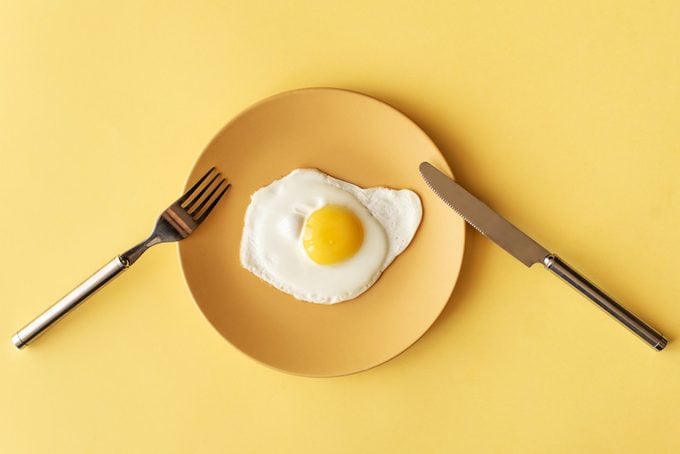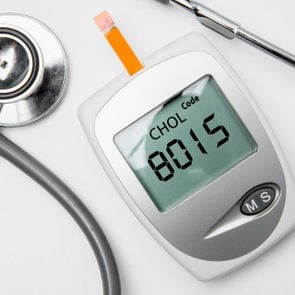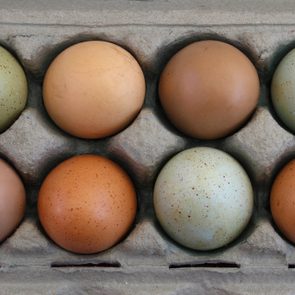The Truth About the Cholesterol in Eggs
Updated: Mar. 11, 2022
Are eggs bad for your cholesterol? The guidelines have changed over the years, so for many of us, the information is still a bit scrambled. Here's what to know before you start cracking.
How incredible is the egg?
In the past, doctors warned people about eating too many eggs. Reasoning at the time went a little like this: There’s cholesterol in egg yolks. Eating eggs is linked to high LDL (“bad”) cholesterol in the blood. The cholesterol in eggs must raise blood cholesterol levels.
Eggs were anything but incredible and edible to the American Heart Association (AHA), which in 1968 published the most widely known dietary recommendation to date. It recommended no more than three egg yolks per week.
Doing so would prevent high LDL cholesterol and the havoc it can wreak on the body—namely, clogged arteries and an increased risk of cardiovascular disease. Or so experts thought.
The reputation of the egg changed in 2015, when the Dietary Guidelines for Americans banished the recommendation to limit eggs. The 2015–2020 Dietary Guidelines for Americans suggests eating as little dietary cholesterol as possible but doesn’t include a specific target to shoot for or set limits on eggs.
Still confused about how many eggs you can eat? Let’s unscramble the information and get to the truth.
What is cholesterol?
When we hear the word “cholesterol,” we have a tendency to think of it as a good-for-nothing element of food, or health-harming stuff in our blood. But that’s an overly simplistic definition.
It’s true that some cholesterol is bad for us. But there’s also “good” cholesterol too. At the end of the day, our bodies need some cholesterol to function.
Cholesterol is a waxy, fat-like substance that is made in the liver and travels throughout the bloodstream with the help of proteins. Together, these particles are called lipoproteins, a combo of lipids (fats) and proteins.
And while that may not sound like a healthy combo, cholesterol is vital to many biological processes, says Khalid Sheikh, MD, a cardiologist at Health First Medical Group in Viera, Florida.
“It is a necessary chemical component for your body to make vitamin D, cell membranes, and many hormones, like testosterone, estrogen, and adrenalin.”
Still, too much of the bad cholesterol—low-density lipoprotein, or LDL—can clog your arteries. When these passageways narrow, blood flow to your heart is limited. And that can cause a heart attack or stroke.
On the flip side, high-density lipoprotein (HDL) escorts the bad cholesterol from the arteries and back to your liver, where it’s broken down and processed by the body. That’s why higher HDL levels are healthier for you.

Are eggs high in cholesterol?
According to the USDA, one large whole egg (about 50 grams) contains 207 milligrams of cholesterol, all of it from the yolk.
That said, studies show most of the cholesterol in our body is made by the liver. The cholesterol in food such as eggs, butter, full-fat milk, and cheeses—dietary cholesterol—doesn’t seem to raise your blood cholesterol levels as much as once thought or in everyone.
So what’s behind the link between food and high cholesterol? According to a study in Nutrients, it’s actually the saturated fat in food that affects LDL cholesterol levels in the body.
That’s why the AHA recommends getting no more than 6 percent of your daily calories from saturated fat.
So if you’re consuming around 2,000 calories a day, that means you should stick to no more than 13 grams of saturated fat. Since one large, raw egg only has about 1.6 grams of saturated fat, it’s a healthy option—unless you combine it with higher saturated foods, like bacon, sausage, and ham on the side.
In fact, a lot of the link between eggs and heart disease might be because people who report eating eggs often eat them with these saturated fat-laden meats.
What does the current research say about cholesterol?
Current research is shedding a more positive light on eggs. The science continues to support the idea that saturated fat in food, not cholesterol, causes health problems for most people.
A major analysis of eggs and cardiovascular disease, published in 2020 in the British Medical Journal, found that eating up to one egg a day did not appear to increase cardiovascular disease risk.
A 2018 study published in the journal Heart found that an egg a day lowered heart disease and stroke risk in Chinese adults. The caveat: the people in the study didn’t eat a Western diet, which typically contains more fat and calories and increases heart disease risk factors.
Another study, published in the American Journal of Clinical Nutrition in 2018, focused on participants with prediabetes and type 2 diabetes. About half of them ate eggs as part of a healthy diet geared toward weight loss. (The others were randomly assigned to a low-egg weight-loss diet.)
The study revealed that eating two eggs a day (or 12 eggs a week) for three months didn’t spike cardiovascular risk factors, no doubt due in part to the healthy diet they ate. And there were no differences between groups a year later.
What’s so great about eggs anyway?
It’s amazing how much nutrition an egg packs inside its small shell. The yolk has loads of vitamins, minerals, and antioxidants.
One large egg has about 72 calories. The majority of those calories come from the fats in the yolk, but that doesn’t mean you should stick with egg whites.
“You would be missing out on the healthy fats by just eating egg whites,” says Rachelle Baker, RD, a clinical dietitian with Health First at Holmes Regional Medical Center in Melbourne, Florida.
For the record, there’s about two grams of monounsaturated fat and one gram of polyunsaturated fat in a large egg.
Eggs are also a source of vitamin D. “There are only a few non-fortified dietary sources of vitamin D, and egg yolk is among them,” says Yulia Brockdorf, a registered dietitian practicing in Hillsboro, Oregon.
And let’s not forget the power antioxidant duo of lutein and zeaxanthin. They’re well known for supporting eye health.
The egg white’s contribution to good nutrition comes via its quality protein, which contains all essential amino acids. “Interestingly, the egg albumin [white] is considered to be a gold standard to which all other food sources of proteins are measured,” says Brockdorf.
In addition to protein, egg whites also contain riboflavin, selenium, and a small amount of potassium.
Nutrients in eggs
A large egg contains the following nutrients and recommended daily values (DV):
Calories: 72
Total Fat: 5 g (6 percent DV)
Cholesterol: 207 mg (69 percent DV)
Carbohydrate: 0.5 g (0 percent DV)
Protein: 6 g (12 percent DV)
Sodium: 64.9 mg (3 percent DV)
Potassium: 66.4 mg (1 percent DV)
Phosphorus: 92.6 mg (7 percent DV)
Vitamin D: 49.5 mcg (11 percent DV)
Vitamin B2: 0.2 mg (15 percent DV)
Vitamin B12: 0.5 mcg (20 percent DV)
Biotin: 11 mcg (35 percent DV)
Selenium: 15 mcg (25 percent DV)
Choline: 150 mcg (25 percent DV)
Lutein: 116 mcg
Zeaxanthin: 115 mcg
How many eggs should I eat?
The AHA removed recommendations to limit dietary cholesterol intake, and the USDA’s Dietary Guidelines for Americans don’t specify a limit. So how many eggs are healthy?
Well, that depends on your specific health and dietary requirements.
“In individuals who already have high cholesterol, it is recommended that they use cholesterol-free egg substitute or eggs with lower cholesterol content,” says Dr. Sheikh. “Otherwise, there does not appear to be any significant health hazards to consuming, on average, one egg per day when incorporated into an overall healthy dietary pattern.”
The healthy dietary pattern is key. Serve your egg with a side of saturated fat and sugar (aka bacon and pancakes), and your meal’s health factor plummets.
The AHA guidelines emphasize fruits, vegetables, whole grains, low-fat dairy products, lean poultry, fish, and nuts as an approach to favorably alter blood lipid levels. So instead of sausages or other breakfast meats, add one of these tasty (and good-for-you) foods to go with your egg.

The best type of eggs for your breakfast
There are literally dozens of chicken eggs, egg substitutes, fortified eggs, and vegan substitutes. It can be downright confusing to know which egg is right for you.
To narrow down your options, first know what your cholesterol levels are. It’s easy to find out with a simple blood test done at your doctor’s office.
If your LDL cholesterol is high or you have other health conditions, such as diabetes or heart disease, your doctor may have specific guidelines for you regarding eggs.
Next, think about your nutrition goals, lifestyle, finances, and beliefs.
Fortified eggs
When it comes to chicken eggs, the nutrition can vary widely depending on the quality of the hen’s food, lifestyle, and welfare, Brockdorf says. Read the labels to see if the eggs coincide with your nutrition benchmarks.
“For example, if you are someone who does not consume omega 3-rich fish or nuts, then the omega-3 enriched eggs may be a good option for you, says Baker. The extra omega-3 in these eggs often comes from fish or mussel meal, which the hens are fed, Brockdorf says.
Organic eggs
You might opt to buy organic. Baker says organic eggs have a slightly different nutrient composition; they’re higher in some vitamins and minerals and lower in others compared with conventional eggs.
Egg substitutes
For those who want to stick with egg whites but are not keen on the time and effort it takes to separate out the yolk, egg substitutes are an option. They generally just contain egg whites.
Vegan eggs
If you don’t eat animal products, you can still enjoy egg substitutes. Just know that you probably won’t get the same nutrient boost as you would from chicken eggs. Some vegan egg options may have similar amounts of protein, but they can lack vitamins D and B12, and other antioxidants.
Depending on your tastes and dietary needs, you might have to scan a few nutrition labels to unscramble the nutrition data before you crack or pour eggs into a pan.
















